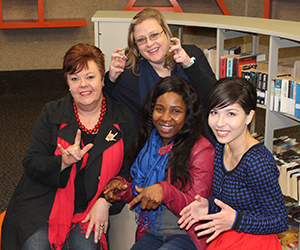Latest News Archive
Please select Category, Year, and then Month to display items
10 March 2022
|
Story Anthony Mthembu
|
Photo Unsplash
 The No Student Hungry team gearing up to start distributing food parcels to the selected students.
The No Student Hungry team gearing up to start distributing food parcels to the selected students.
The UFS is one of the many institutions of higher learning where food insecurity is an active issue. However, the
No Student Hungry Programme is one of the initiatives launched at the university to assist in fighting food insecurity at the institution.
The purpose of the programme
Since its inception in 2011, the initiative has assisted many students in acquiring a healthy meal. Additionally, the Food Environment Office also hands out food packages, so that students can continue to achieve academically. “We are trying to develop a healthy environment for students and make it easier for them to have a nice and healthy meal,” stated Annelize Visagie, who heads the Food Environment Office at the UFS. The Food Environment programme is spread out on all three campuses, each with its own facilitators. Furthermore, the programme mainly caters for students who are not funded by the National Student Financial Aid Scheme (NSFAS) but who are excelling academically. The abovementioned students apply for assistance online, and a list is then drawn up of students who receive assistance for the year.
Alternative solutions to keep the initiative running
On the Bloemfontein Campus, the No Student Hungry Programme will be catering for 200 students in the 2022 academic year, assisting them with a daily nutritious meal. Additional food parcels are also handed out to provide further assistance. “We give food parcels to the students on the list every Tuesday and Thursday at the Thakaneng Bridge,” Visagie highlighted. However, she argues that catering for the student population through this programme can be a challenge, as the demand for assistance is growing rapidly and the ability to assist is limited. The programme relies on partnerships and sponsors to assist the student body. In fact, the coordinators of the programme currently have a memorandum of understanding with Tiger Brands according to which they deliver around 100 food parcels for distribution.
In addition, the coordinators have put in place alternative measures to ensure that they can provide more food to students. “The
Kovsie Act Office, in partnership with the
Department of Sustainable Food Systems and Development, has started a food garden where healthy and nutritious produce are grown, in order to add value to the distribution,” she indicated. Although the programme can only assist to a point, students who are in desperate need of assistance are never turned away. In fact, the
Social Support Unit at Thakaneng Bridge usually assists students with food vouchers for a maximum of four days.
A commitment to teaching healthy eating habits
The programme is not only committed to curbing food insecurity, but also to ensuring that students have a healthy and balanced diet. As such, a booklet is being issued by the
Department of Nutrition and Dietetics in collaboration with the Department of Sustainable Food Systems and Development, which contains ways in which students can make a healthy meal using some of the ingredients offered in the food parcels.
“We want to teach students how to eat healthy in the cheapest way, because they don’t have a lot of money to buy expensive food products,” Visagie argued.
Largest group on African continent introduced to Sign Language
2016-07-05
 The introduction of basic Sign Language
The introduction of basic Sign Language
as part of the UFS101 course was a great
success. From left are Susan Lombaard,
Annemarie le Roux, Tshisikhawe Dzivhani
(all from the Department of South African
Sign Language), and Lauren Oosthuizen
(UFS101). Photo: Leonie Bolleurs
As a result of a new initiative at the University of the Free State (UFS), the largest group of students on the African continent took part in a first-year seminar which included Sign Language.
A total of 5400 students on the Bloemfontein Campus and 1000 on Qwaqwa Campus were taught basic Sign Language by Susan Lombaard, Acting Head of the Department of South African Sign Language, and her team members, Tshisikhawe Dzivhani, Annemarie le Roux, and Nicolene de Klerk.
It forms part of the UFS101 module presented to all first-year students. The initiative, begun in the first semester of 2016, will form part of UFS101 in future and was met with an overwhelmingly positive response.
Three segments of course
Sign Language was taught in three segments and positioned as large-class learning experiences in the Callie Human Centre (Bloemfontein Campus) and the Nelson Mandela Hall (Qwaqwa Campus). Students were taught about deaf culture, Sign Language theory, as well as how to sign their names, exchange pleasantries, and have a basic conversation.
A valuable skill to have
“It (the Sign Language experience) was very interesting and helpful,” said one of the students. “It is important to have the ability to communicate with all sorts of people, and to be able to help them in a crisis”. According to another, it sparked an interest in Sign Language. “It is a skill I will continue to use and try to learn more from it,” said a third.
Lombaard – in collaboration with the UFS101 team – will be presenting a paper related to this achievement at the DeafNet Africa Conference in Johannesburg, from 26 to 30 September 2016.